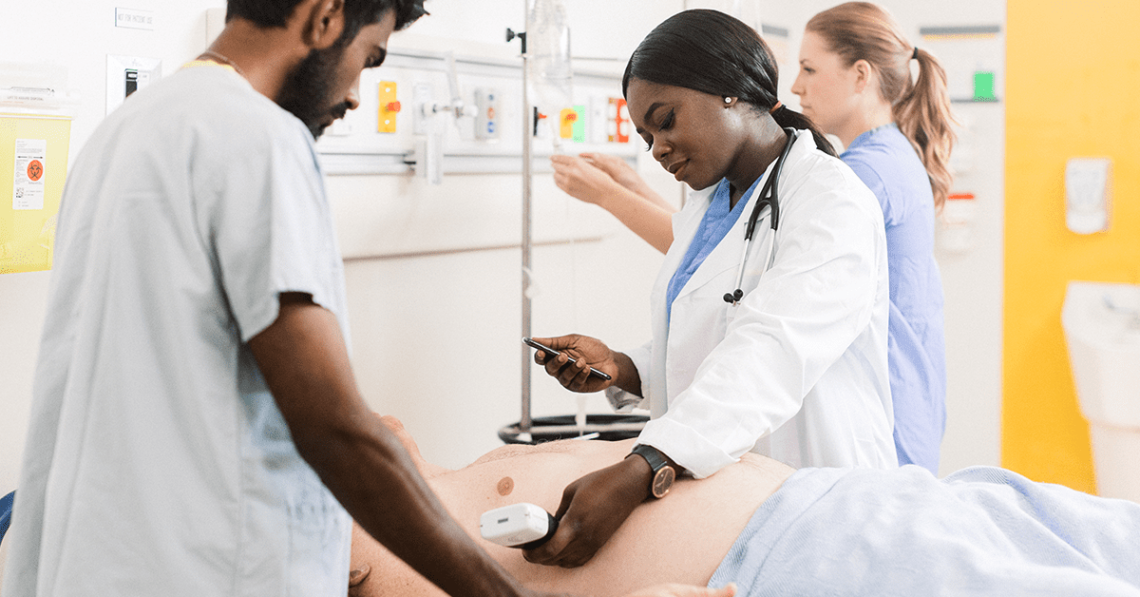Unveiled at the beginning of 2020, the Point-of-Care Ultrasound for COVID-19 project’s overarching goal is to provide ultrasound bedside tools for doctors in urban, rural, and remote communities.
These advanced tools combine machine-learning technology, portable devices and a cloud-based platform to create an integrated point-of-care network that ensures accurate diagnoses for Canadians while reducing the need for specialized training.
“It’s about democratizing health care and eliminating the discrepancy between the quality of care in rural and urban areas,” explained Prof. Purang Abolmaesumi of the University of British Columbia, one of seven diverse organizations collaborating on the project. “For the first time, we have integrated handheld ultrasound devices into a unified AI-powered platform that provides the medical data and image quality needed by physicians in every part of the province.”
The need for speed
Initially targeting heart and pregnancy-related conditions, the project quickly pivoted when the Digital Technology Supercluster launched its $60-million COVID-19 Program. That’s because there is growing evidence that lung ultrasounds can reduce mortality rates in COVID-19 patients by speeding up the detection of pneumonia.
“The project will deliver handheld PoCUS technology to communities across BC. And it will allow primary care providers to acquire clinically-relevant data at the patient’s bedside,” says Dr. Oron Frenkel, an emergency physician at St. Paul’s Hospital. With impressive speed, the consortium’s members – Providence Health Care, Change Healthcare, Clarius Mobile Health, the University of British Columbia, St. Paul’s Foundation, the Rural Coordination Centre of B.C., and the Vancouver Coastal Health Authority – joined forces to deploy more than 80 Clarius portable handheld ultrasound scanners in remote communities and long-term care homes across the province.
“Ultrasound has been a game-changer for rural care in general, allowing immediate diagnoses for triaging and expediting trauma cases to higher levels of care,” said Dr. Virginia Robinson of the Fernie-based Rural Coordination Centre. “The establishment of the COVID network means physicians will be able to share their images with any specialist and receive immediate feedback.”
Long-term benefits
The value of this technology will endure long after COVID-19 . “This project is delivering handheld point-of-care ultrasound technology to Canadian communities, allowing primary care providers to acquire clinically relevant data at the patient’s bedside,” says Dr. Oron Frenkel, an emergency physician at St. Paul’s Hospital.With only 5 percent of B.C. physicians having achieved the minimum competency required to interpret scans, sharing data and expertise through the network will provide even novice ultrasound users with vital information, Dr. Robinson added, and will help reduce the delays and other difficulties affecting up to 40 percent of the province’s diagnostic imaging tests. At the same time, the project is assembling Canada’s first ultrasound library for lung diseases including COVID-19.
“In five years, our goal is for GPs across the country and around the world to use handheld ultrasound as a primary tool for when patients first come into their offices,” said Kris Dickie, vice-president of research & development at Clarius. “Bringing this potentially life-saving technology to more people is our mission, and it’s fantastic that the Supercluster is supporting and accelerating our ability to collaborate with innovators at other organizations that share the same goal.”
Travel costs incurred by the health system and by individuals will also come down. It costs about $20,000 to transfer a patient from a rural setting to an urban centre for urgent diagnostic imaging, while patients themselves are out of pocket on several levels when they have to travel for non-urgent ultrasounds, especially first trimester obstetric ultrasounds.
“It’s important that we recognize the toll the COVID-19 pandemic has taken on people in B.C., especially those who have lost loved ones, however it has also brought out the best in our province when it comes to state-of-the-art techniques to help in the battle against this deadly virus,” said Adrian Dix, Minister of Health. “ The Point-of-Care Ultrasound project has been quickly re-purposed to potentially detect COVID-19 in people and I’m proud that our government supports this type of important innovation.”
